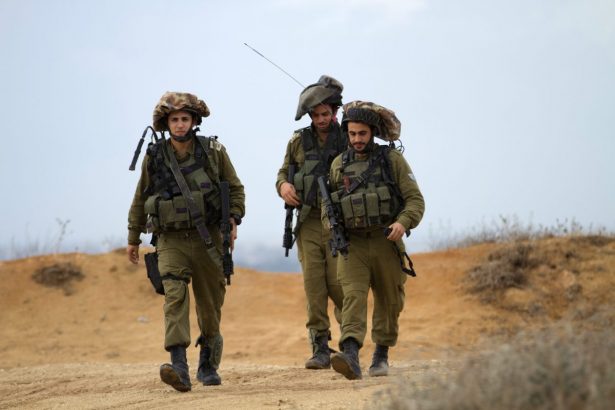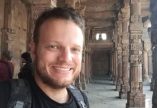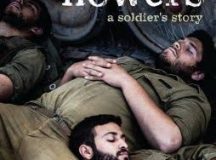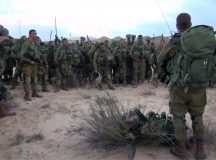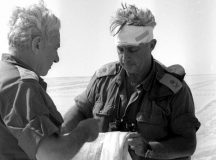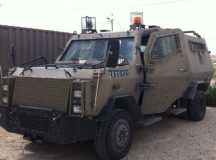Soldiers’ Talk: Protective Edge (2019) is a set of interviews with those who served in Gaza in 2014. It is published fifty-two years after the original Soldiers Talk, a famous set of testimonies collected after the Six-Day War by Amos Oz and others. In this moving essay Tal Kra-Oz maps the history of Israeli soldiers talking about their army service and their trauma – from the Six-Day War through the years in Lebanon to Operation Protective Edge in Gaza in 2014. Theirs is a literature that walks a line between the personal and the political, that rarely satisfies left or right, but is a mitzvah [good deed], revealing the price of war and helping soldiers know they are not alone. As the pandemic turns Israelis inward, and as the online phenomenon of Israeli soldiers talking out their experience with each other grows, the way Israelis talk to each other about the military, war, and bereavement may be about to change forever.
For the first time in Israel’s history, the nation’s military cemeteries were shuttered on Memorial Day. Ceremonies were televised, with no live audiences present. Despite recent easing to social distancing guidelines, the threat of crowds of bereaved families and comrades congregating around burial plots was deemed too dangerous. Instead, the government urged people to visit the graves of their loved ones in the week leading up to Memorial Day.
By its nature, bereavement is the most private of lived experiences. But from the country’s earliest days, the acts of mourning and remembrance could not be more public. It would be easy to write off the week that begins with Holocaust Memorial Day and ends with the bipolar one-two punch of Memorial Day for Fallen Soldiers and Independence Day as masterful state indoctrination, were it not for the deeply intimate feelings those days evoke for each and every member of Israeli society, leaving no one indifferent. And yet, so much of what is felt and remembered remains unspoken in the official ceremonies: IDF veterans and their memories of combat, bereaved families struggling daily to face the void, and the complex reactions of the country’s large Haredi and Arab populations.
As with every other aspect of life, the pandemic has turned Israelis inward. And in so doing, it has accelerated a trend that might forever change the way Israelis talk to each other about the military, war, and bereavement.
It began when Eyal Shachar, a television director, set up a private Facebook group called Stories from Lebanon – What Happened in the Outposts in late March. Shachar had planned on writing a drama series about the long years the IDF spent in Lebanon, between the Lebanon War in 1982 and the army’s final withdrawal in May 2000. Shachar himself had only enlisted in 2006, and he intended Stories from Lebanon to be a virtual focus group where he could collect ideas for his series. He invited a handful of people he knew had served there. Two weeks later, the group had sixteen-thousand members. It has almost thirty-five thousand at the time of this writing, and has become a sort of organic, ever-growing and lavishly illustrated oral history.
On an hourly basis, veterans of the Israeli army’s outposts in South Lebanon process memories and share stories many swear they’ve never told before. Stories of being sniped at and mortared, of long nights spent lying awake in ambush, of the gallows humour they developed to cope with their bizarre circumstances: being cooped up in deadly concrete outposts with names like Beaufort, Basil and Pumpkin, with some of the most beautiful views in the Middle East. Men who were then in their late teens and early twenties are now in their forties and fifties. Their conversations are sometimes gruesome but are largely devoid of heroics, save for a tall tale here or there. They know their fellow veterans can’t be bluffed.
Stories from Lebanon has been the harbinger of a strange renaissance. There are Facebook groups for older veterans, those who fought in the War of Attrition and the Yom Kippur War, and for younger ones, focusing on the army’s time in the Gaza Strip both before and after disengagement (where I’ve found photos of myself). As Eitan Leshem remarked in Haaretz, in every generation Israel fights another forgotten war, and when that war is over there are those who live and remember each and every detail.
In the run up to Memorial Day, members shared posts memorialising their fallen brothers in arms, and the groups held their own virtual ceremonies via Zoom teleconference. But the mood is usually far from morose. Elaborate pranks are recounted and friendships rekindled. In the Lebanon group, one Golani fighter even discovered that a friend he was sure had been killed in South Lebanon twenty-three years ago was in fact alive—and in the group. Former top brass have joined as well, as has former Defence Minister Naftali Bennett. For a few hours, debate raged as to whether a user called Benny Binyamin could possibly be who he said he was—former Chief of Staff and Prime Minister designate Benny Gantz, the last Israeli soldier to leave Lebanon—until a sheepish Gantz posted a video saying that it indeed was him, and that he looked forward to chatting with the other members of the group.
Israel’s 15-year occupation of the ‘security zone’ in South Lebanon was a defining experience for every Israeli soldier in the ‘80s and ‘90s. Though it left almost 600 soldiers dead and many thousands injured or emotionally scarred, it has not been recognised as a war or campaign worthy of its own name and service ribbon. Were it not for a handful of literary and cinematic works, one fears it might have been forgotten by all who did not serve there, or lose someone they loved there. Ron Leshem’s novel Beaufort and its film adaptation by Joseph Cedar, along with Ari Folman’s animated documentary Waltz with Bashir helped immortalise Lebanon for those fortunate enough not to have experienced it firsthand. Matti Friedman is another self appointed keeper of the flame, with his book Pumpkinflowers: A Soldier’s Story of a Forgotten War and War Without a Name, the new TV documentary series he created with Israel Rosner (think an Israeli version of Ken Burns and Lynn Novick’s mammoth The Vietnam War—leaner but riveting).
With the twentieth anniversary of the IDF’s withdrawal fast approaching, the cumulative effect of those cultural milestones and the wildly popular Facebook group has finally spurred talks to grant a name to the long war in South Lebanon, and a service ribbon to its veterans. But for a generation of once-young men haunted by the land of cedars, true comfort and closure will be found not in military insignia but in old-fashioned companionship and camaraderie.
*
Stories from Lebanon is only the most recent chapter in the complicated history of Israeli soldiers talking about their service. Soldier’s Talk is another. One evening in February, I attended a book launch in Jaffa, at an ancient well house turned community centre. That morning had brought reports of skirmishes on the border with the Gaza Strip. A small room in the centre was packed with people who had come to hear stories from earlier skirmishes.
Two bearded men in their mid-twenties, Gal Ben Ari and Tamir Yogev, were hosting the event for their book Soldiers’ Talk: Protective Edge. The book is a collection of conversations with combat soldiers who participated in Operation Protective Edge in Gaza, in the summer of 2014. Ben Ari and Yogev are members of the Tarbut (culture) movement. Founded in 2005, the group is dedicated to bringing about social change through art. Young members can opt to serve in the army together, in the Nahal infantry brigade, which is how some of them found themselves in a home by the pier of a Hamas tunnel, on the outskirts of Beit Hanoun, in Northern Gaza.
Their Nahal platoon was tasked with securing a combat engineering unit that was engaged in dismantling the tunnel. The men spent their time guarding the home from various lookout posts. Their thirteen days in the strip were long and largely uneventful, save for when Natan Cohen, a nearby tank platoon leader, was shot by a sniper. The Nahal medics gave him emergency care, but he died.
‘We thought Protective Edge was something that had simply happened,’ Ben Ari said. ‘It was terrible, and then it was over. But talking with friends in the movement, a lot of things burst into the open. Soldiers’ Talk is about what we felt, not about what we did.’
The title Soldiers’ Talk consciously evokes that of a much earlier, similar volume, first published almost fifty-three years ago, which recorded conversations with soldiers who had participated in the Six Day War (it was translated into English as The Seventh Day). That book was the first major literary work to question the war’s triumphant narrative, and it did so from the heart of the establishment: most of the soldiers interviewed were kibbutzniks, and a young Amos Oz was one of the editors.
Like the original Soldiers’ Talk editors, Ben Ari and Yogev began diligently recording conversations among their fellow soldiers, at an outpost by the Egyptian border, while passing away the time in an ambush, and in living rooms years after the operation. They also collected poetry and essays. In one essay, Yogev wonders how his own home would look if a platoon of soldiers were to conquer it.
Where would they set up the FN MAG machine gun? How many sandbags would they need to secure the windows? And how would it look after a whole platoon had been using it for two weeks?
At the book launch, friends were called up for impromptu readings of dialogues recorded verbatim in the book, like a stage play. On the page and in person, Ben Ari, Yogev and co. more than live up to the Nahal stereotype of philosopher-soldiers: anti-grunts too verbose for their own good. They were the sort of soldiers that debated at length whether to use the Gazan family’s oil for their own cooking, or whether it was appropriate to drink their coffee (soon after their unit left, the building was demolished, rendering the point of their ethical dilemmas moot). In the midst of the hubbub and confusion of the operation’s early days, they had the wherewithal to remember that exactly three years earlier, 14 July 2011, was the day the first tents were pitched on Rothschild Boulevard in faraway Tel Aviv, and to mark that auspicious anniversary with chants and songs from the J14 Protests.
Many would say that the men in the book subscribe to an old tradition Israelis have taken to calling—with varying degrees of cynicism—yorim ve’bochim, or ‘shooting and crying’. Soldiers with the muscle and training to get the job done, but with a conscience that won’t let them forget their actions, they come across as shamefully defeatist to the right and embarrassingly conformist to the left. Another soldier, Itamar Alroey, wrote of guarding the Gazan family whose home the platoon occupied. ‘I guarded them for a long time, it was like during arrests [in the West Bank], but also very different. After all, just a few moments ago, we’d flattened their neighbourhood. I exchanged many glances with them, my gaze was full of embarrassment and guilt, a sort of unpleasantness,’ he wrote in his journal. ‘How can you feel good about yourself in such a situation? They conveyed an interesting indifference, as if they had already seen everything. I was eager to speak with them, as always, to ask them what they think of us? How do they deal with IDF attacks? Do they believe in peace? What do they think about Hamas? If only I spoke Arabic.’
When the original Soldiers’ Talk was published, it stood in stark contrast to the victory albums that could be found on many a coffee table in late 1967, full of photographs of the IDF’s tanks, planes and generals. An unlikely bestseller, the original Soldiers’ Talk set out, as Ben Ari and Yogev put it, to ‘discover the meaning of the silence beyond the joy of victory’. Those soldiers were almost all kibbutzniks, products of the Labor movement’s elite. The book became a defining document of the Israeli Left, an early warning that the heady atmosphere that followed the war could end in tragedy.
In an article written on the fiftieth anniversary of the Six-Day War, Omer Eynav compared and traced the influence of Soldiers’ Talk and the Movement for Greater Israel on Israeli discourse. Both were forged in the shock of victory and came to signify their respective political poles, solidifying the paradigms that govern those poles to this day. Soldiers’ Talk—the original artifact of the ‘shooting and crying’ tradition—reflected the doubts and question marks of the Old Left. The Movement for Greater Israel—with its insistence on settling the newly conquered West Bank, Gaza Strip, Golan Heights, and Sinai Peninsula—represented the exclamation point of the New Right, which was to dominate much of the ensuing half-century of Israeli politics and warfare.
How can we account for the five-decade gap between the two Soldiers’ Talk volumes, I asked Eynav, a fellow at Molad and the Weizmann Institute for the Study of Zionism and Israel at Tel Aviv University. ‘The original book wasn’t political, but it did reflect the thinking of an ideologically and politically distinct group from the kibbutz movement. It marked the beginning of the sunset era of the left and the ‘working settlement movement’, and the rise of Gush Emunim, the settlers’ movement. As a result, there’s been a decline in what the left has to offer,’ he told me. ‘The ‘shooting and crying’ phenomenon didn’t go away, but it was channeled elsewhere, outside the intellectual sphere, to movements like Breaking the Silence, which is a completely political body, and uses soldiers’ experiences as a means rather than an end in itself.’
In recent years, Eynav pointed out, the IDF has begun conducting workshops for combat soldiers with PTSD, oftentimes abroad, alongside civilian groups like Resisim (Shrapnel) that help soldiers process and work through difficult memories. ‘The focus on post-trauma hasn’t gone away—it’s grown. But it’s shifted to groups with less of a public presence,’ he said. ‘It’s been privatised and no longer has any political or ideological pretensions.’
The new Soldiers’ Talk is unique in how it walks the line between the personal and the political. It includes reports that would not be out of place in a Breaking the Silence collection, but with none of the tendentiousness. The soldiers in the book are proud to have served in Protective Edge, ashamed of some of their actions, have serious doubts about the wisdom of the operation and would not have missed it for the world.
Some of the critiques have been harsh, the editors said at the book launch. You didn’t see any action, soldiers have written them. Sixty-eight soldiers were killed in Protective Edge, but the ones in the book spent the war holed up in somebody’s kitchen. For that reason, too, it is a minor work when compared with the Six Day War edition, but it is also far more evocative of how most Israelis today experience their military service: an interminable struggle to stay awake and alert while not much happens. Soldiers in Gaza and the West Bank are cogs in the machine, with skin in the game but no responsibilities beyond guarding, eating and sleeping. They are grateful for the lack of action and frustrated with it at the same time. ‘You really ask what you went through and it’s unclear,’ Yogev wrote. ‘Maybe nothing happened at all? We went in. It was hot. We were there for two weeks and then were out. We didn’t shoot at anything, we don’t know if we hurt anyone. It’s dim, gray like that.’
Writing for Haaretz, the sociologist Uri Ben-Eliezer pointedly accused Ben Ari and Yogev of propagating the myth that Israel has no choice but to fight. ‘Their crying and tut-tutting actually whitewash the occupation,’ he wrote. ‘It’s an Israeliness that falls into the simplistic trap of ‘good guys’ vs. ‘bad guys’, so much so that the reader will be hard-pressed to find any reservations about the horrors of war.’
Nissim Calderon is another Nahal veteran, but of the Six-Day War generation. When the Professor Emeritus of Literature at Ben Gurion University took to the stage at the well house, his remarks were a pointed rebuttal to the whitewashing complaint. ‘In Protective Edge, we were fighting to defend the children of Sderot and Netivot—and they certainly deserve that defence. But we were also fighting because we don’t want to make peace with the Palestinians. Those two wars are intertwined, and they have a price. By talking amongst yourselves, coping with your awful traumas, and then publishing the results, you confront Israeli readers with the price of war,’ he told the book’s authors. ‘That’s a price that hasn’t permeated enough into Israeli society, allowing us to continue living as a villa in the jungle. David Grossman once said, we set out to build a home and we ended up building a fortress. It’s a mitzvah [good deed] to do what you’ve done, to reveal that price. What war does to the soldier, to his relationship with his sister, his mother, his friends.’
‘No one can wash their hands of this,’ Calderon told me when I called him recently. ‘The idea that the occupation is something that belongs to the territories, that it isn’t here. That we can sustain an economy, culture and politics—that we can hold election campaigns where no one utters the word “occupation”. That it’s only the problem of the soldier who makes the arrest. It’s on our hands, in the taxes we pay and the taxes our American friends pay to an administration that supports annexation. Thanks to books like this, we all know we have a hand in this.’
*
When soldiers returned home from Lebanon in the ‘90s, many would refer to themselves as sarut—mentally ‘scratched’ for life. In one of his conversations with his friends after Protective Edge, Tamir Yogev recounted his first visit home after the operation. ‘I came to the kibbutz and got asked a lot of questions,’ he said. ‘I went to the shop and the pool and they were asking me, how many terrorists did you kill? They know I’m a leftist so they asked me, which side did you fight on? Are you sarut? They kept asking me, are you sarut? Are you sarut?’
With some luck, kids in youth groups will share dog-eared copies of Soldiers’ Talk: Protective Edge in the years to come. It will do little to prepare them for the struggles and dilemmas of their own forthcoming service, but they will know that they are not alone. The activity in the Lebanon and Gaza groups will peak and subside, but the veterans of those long wars finally have the community they need, at least for the foreseeable future.
When soldiers talk about their actions, the effect is therapeutic for them, but it can also be a godsend for the country on behalf of which they fought. As Calderon pointed out to me, ‘quiet, we’re shooting’—the ubiquitous call for unity in the face of emergency—is a compelling ethos in Israeli society, because of our history as a persecuted, but also internally divided people.
There’s a danger that that ethos will destroy Israeli democracy, because it is inherently atavistic. It sends us back to traumas that are beyond thought and debate, to our most childish and primitive instincts. But these soldiers say, ‘one moment, I’m a soldier but I’m also thoughtful and have a conscience and so I refuse to keep quiet’. We didn’t win our wars because we were more powerful than our enemies, or because of ‘quiet, we’re shooting’, but because we were a free and thoughtful society. Both generations of Soldiers’ Talk undermine that atavism. It isn’t easy. But the most wonderful tradition we have is ‘in defence of confusion and against whitewashing’. Do you know that phrase by Berl Katznelson? It’s the most precious thing we have.

